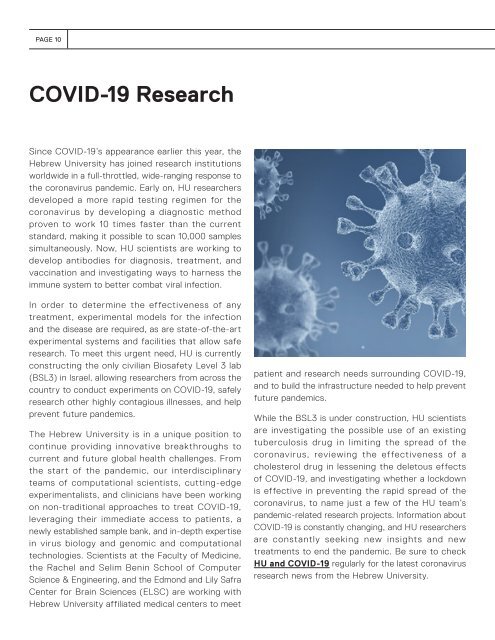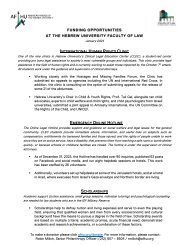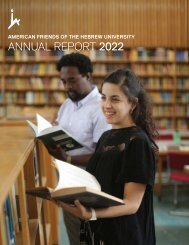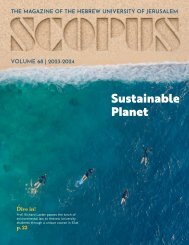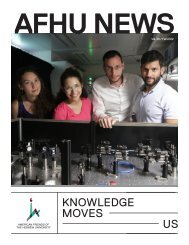FINAL_AFHU_News_11.4.20
You also want an ePaper? Increase the reach of your titles
YUMPU automatically turns print PDFs into web optimized ePapers that Google loves.
PAGE 10<br />
COVID-19 Research<br />
Since COVID-19’s appearance earlier this year, the<br />
Hebrew University has joined research institutions<br />
worldwide in a full-throttled, wide-ranging response to<br />
the coronavirus pandemic. Early on, HU researchers<br />
developed a more rapid testing regimen for the<br />
coronavirus by developing a diagnostic method<br />
proven to work 10 times faster than the current<br />
standard, making it possible to scan 10,000 samples<br />
simultaneously. Now, HU scientists are working to<br />
develop antibodies for diagnosis, treatment, and<br />
vaccination and investigating ways to harness the<br />
immune system to better combat viral infection.<br />
In order to determine the effectiveness of any<br />
treatment, experimental models for the infection<br />
and the disease are required, as are state-of-the-art<br />
experimental systems and facilities that allow safe<br />
research. To meet this urgent need, HU is currently<br />
constructing the only civilian Biosafety Level 3 lab<br />
(BSL3) in Israel, allowing researchers from across the<br />
country to conduct experiments on COVID-19, safely<br />
research other highly contagious illnesses, and help<br />
prevent future pandemics.<br />
The Hebrew University is in a unique position to<br />
continue providing innovative breakthroughs to<br />
current and future global health challenges. From<br />
the start of the pandemic, our interdisciplinary<br />
teams of computational scientists, cutting-edge<br />
experimentalists, and clinicians have been working<br />
on non-traditional approaches to treat COVID-19,<br />
leveraging their immediate access to patients, a<br />
newly established sample bank, and in-depth expertise<br />
in virus biology and genomic and computational<br />
technologies. Scientists at the Faculty of Medicine,<br />
the Rachel and Selim Benin School of Computer<br />
Science & Engineering, and the Edmond and Lily Safra<br />
Center for Brain Sciences (ELSC) are working with<br />
Hebrew University affiliated medical centers to meet<br />
patient and research needs surrounding COVID-19,<br />
and to build the infrastructure needed to help prevent<br />
future pandemics.<br />
While the BSL3 is under construction, HU scientists<br />
are investigating the possible use of an existing<br />
tuberculosis drug in limiting the spread of the<br />
coronavirus, reviewing the effectiveness of a<br />
cholesterol drug in lessening the deletous effects<br />
of COVID-19, and investigating whether a lockdown<br />
is effective in preventing the rapid spread of the<br />
coronavirus, to name just a few of the HU team’s<br />
pandemic-related research projects. Information about<br />
COVID-19 is constantly changing, and HU researchers<br />
are constantly seeking new insights and new<br />
treatments to end the pandemic. Be sure to check<br />
HU and COVID-19 regularly for the latest coronavirus<br />
research news from the Hebrew University.


